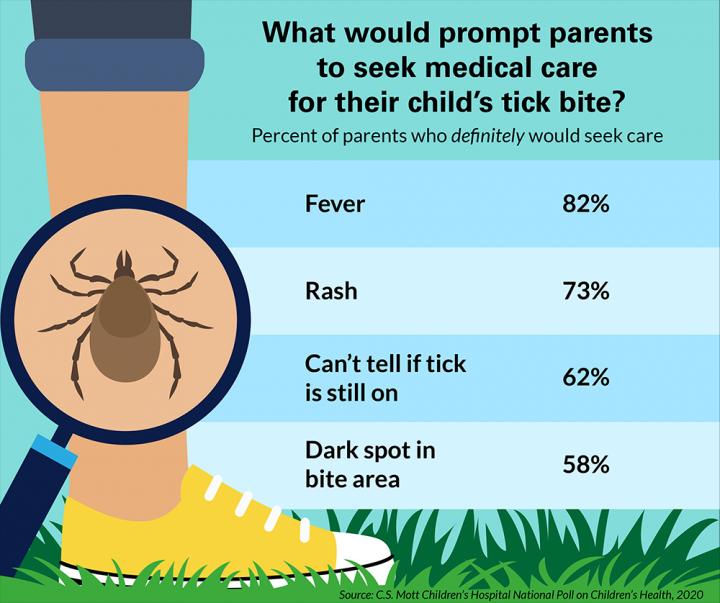Just 1 in 3 parents use a bug repellent on their child that contains DEET, which is most effective in repelling mosquitos, new national poll finds.

Credit: C.S. Mott Children’s Hospital National Poll on Children’s Health at Michigan Medicine
ANN ARBOR, Mich. — Not all bloodsuckers are created equal in parents’ eyes.
When it comes to bug bites, parents are twice as likely to be concerned about ticks as they are about mosquitoes transmitting disease, a new national poll finds.
But as children spend more time outside, families may not always know the best way to protect them from both of these pesky insects.
Among parents who use bug repellent, just one in three use ones containing N,N-Diethyl-meta-Toluamide (DEET) – which is most effective against mosquitoes – according to the C.S. Mott Children’s Hospital National Poll on Children’s Health at Michigan Medicine. DEET has been tested and approved for children ages two months and older when used as directed.
“Many bug bites from mosquitoes and ticks will cause irritation or discomfort for children. But in some less common instances, they may also potentially transmit disease,” says poll co-director Gary L. Freed, M.D., M.P.H.
“Choosing the appropriate bug repellent can be confusing for parents,” he adds. “Some may protect against mosquitos but not ticks, for example. Parents should research the options and recommendations before deciding what to use based on their child’s age and their outdoor plans.”
Although it is uncommon, mosquitos may carry and transmit viruses like Zika, West Nile and Eastern Equine Encephalitis (EEE), which can all potentially cause disability or death in humans and animals.
In the summer of 2019, EEE made a comeback in the U.S., with a significantly higher number of cases reported than the typical average of eight cases a year. The virus can cause mild, flu-like illness but 20% of people infected get much sicker. A third of those who develop a condition called encephalitis – when the virus inflames the brain – die.
Some summers, ticks have also been more rampant in certain parts of the country than others. Among diseases they may carry is Lyme Disease, a potentially serious bacterial infection that can cause flu-like symptoms and joint pain and weakness in the limbs.
The nationally-representative Mott Poll report is based on responses from 1,120 parents who had at least one child age 5-12 years.
Most parents say they usually use bug spray for their children, but they are more likely to do so in wooded and swampy areas than at a local park or in their yard or neighborhood.
While DEET protects against mosquitoes, it is less effective in repelling ticks. Repellents containing picaridin, which provides better protection against ticks, are also a safe option for children two months and older . But parents should be conscious of keeping young children from getting repellent on their hands or faces to prevent irritation on the eyes and mouth, Freed notes. The best repellant for ticks is permethrin, but it should only be sprayed on clothing and never directly on skin.
Nearly half of parents polled choose a repellent specifically advertised for children while 30% use “natural” or homemade products. Oil of lemon eucalyptus is among recommended alternatives for those who prefer a chemical-free repellent but should only be used for children over three years.
Other parent strategies to prevent bites center around clothing, according to the report. Parents say they often have their child wear long pants and sleeves (34%), light colored clothing (21%) or always wear shoes (73%). About one in five parents have their child avoid soaps or shampoos with a floral scent.
Nearly half of parents also give their children oral antihistamines to provide relief from bites while 40 % prefer calamine lotion and 27 % use rubbing alcohol. Many parents also use home remedies, including an ice cold rag, oatmeal baths and baking soda.
Signs to watch for
Most parents polled would appropriately respond to concerning symptoms after a bug bite. The majority say they would definitely seek medical care for their child if they had a fever (82 %) or rash (73%). More than half would seek care if they couldn’t tell if a tick was still attached (62%) or if there was a dark spot in the bite area (58%).
“Because some mosquitoes and ticks may carry certain diseases, parents should contact their child’s health care provider if their child develops fever, headache, or body aches within 3-14 days of a bite,” Freed says.
The most common strategies among parents to remove a tick from their child included pulling it off with tweezers (72%), applying rubbing alcohol (23%), using a fingernail or credit card to scrape it off (19%) or covering it with Vaseline (13%).
Experts recommend using tweezers as a first choice, grasping the tick close to where it’s attached and pulling straight up without twisting or crushing the insect.
Although ticks will burrow into the skin in order to suck blood, their bite is painless. An infected tick usually has to stay attached for 24 hours or more before transmitting the organism that causes Lyme disease. These are reasons why “tick checks” are important before and after outdoor outings, Freed says.
“After hiking in the woods or high grassy areas, parents should always check their kids for ticks, especially looking on the back, neck, hairline and around the groin areas,” Freed says. “It’s important to find and remove them quickly to reduce the risk of disease transmission.”
###
Media Contact
Beata Mostafavi
[email protected]




